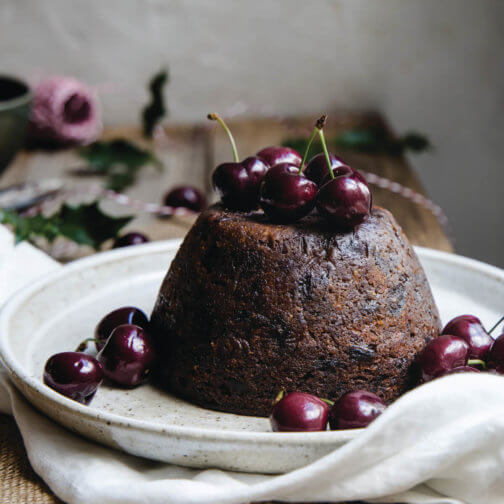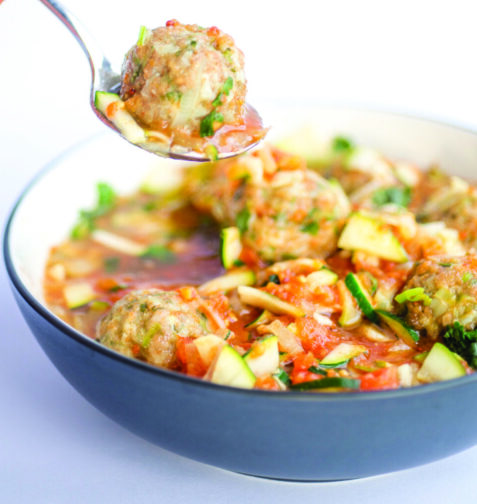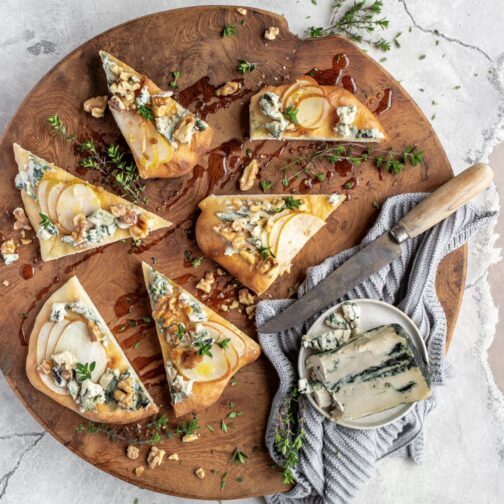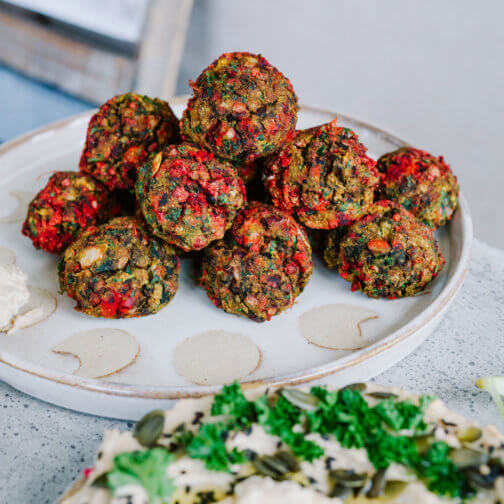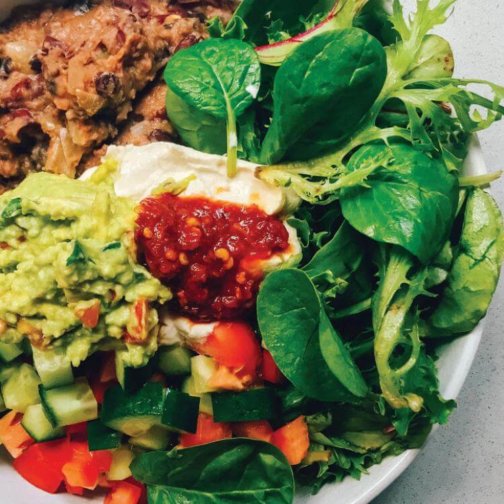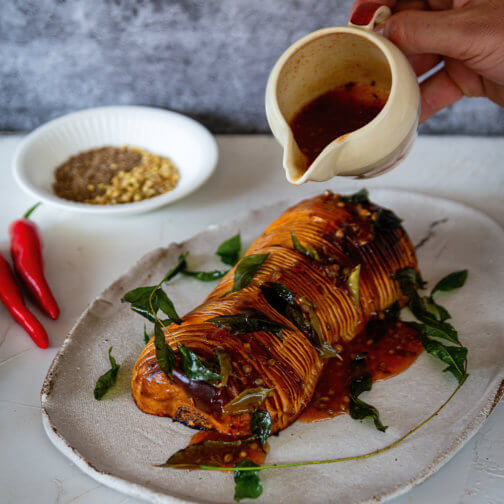
Probiotics are the friendly gut microbes known to play a profound role in our health and wellbeing. Here are six delicious ways to get more of them into your diet.
We’ve all heard about the benefits of a healthy and diverse gut microbiome. From digestion and immunity to protection from certain cancers, it’s clear that our gut health has a profound effect on all-round health and wellbeing.
Consuming a wide variety of fruit and veg is fundamental when it comes to nourishing and diversifying our gut flora. This is mainly thanks to the fibre and resistant starch content in plants, which serves as food (or prebiotics) for the beneficial bacteria (or probiotics) that we want to thrive. But it doesn’t stop there. We can consume friendly bacteria directly too, through healthy and delicious food and drinks that contain live probiotic cultures. These come in the form of fermented and functional foods brimming with active bacteria that help to build and maintain a balanced gut garden.
Here are six vegan sources of probiotics to include as a regular part of your lifestyle.
1. Kimchi
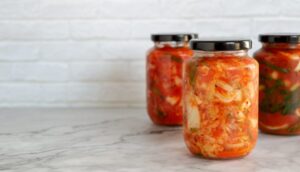
Kimchi is a traditional Korean condiment made on a base of fermented cabbage, which has become popular around the world – and for good reason. Not only is it a delicious and versatile way to add a kick of spicy flavour to a wide range of savoury foods, but it is packed with gut-loving probiotics, in particular lactobacillus and leuconostoc.
While kimchi traditionally contains fish, it is now easy to find vegan versions in both Asian stores and mainstream supermarkets. Or you can make your own, and simply swap out the fish sauce for soy sauce, tamari, miso, or a store-bought vegan fish sauce. It’s just as delicious, research has found it contains the same beneficial probiotic strains as the traditional kind.
2. Yoghurt
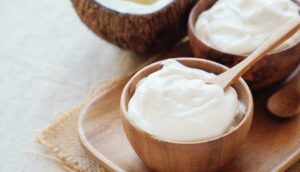
Yoghurt is another traditional fermented food, known for its gut-healthy strains of bacteria, especially lactobacilli and bifidobacteria. And for those of us avoiding dairy, we are in luck: plant-based yoghurts abound, with soy and coconut the most widely available options. Whatever the milk base, the key is to make sure your yoghurt contains live cultures. This can be established by checking the label for claims such as “live cultured with probiotics”, or a line on the nutrition panel stating the number of colony-forming units or CFUs.
If you’re down for making your own, this is a great option, too – and easier than you might think, involving just a few simple wholefood ingredients, plus a plant-based starter, which can be grown from a probiotic capsule or simply from leftover store-bought yoghurt.
3. Kombucha

This lightly sparkling, tangy fermented drink has become popular in recent years as a health-conscious alternative to alcoholic or sugary soft drinks. Thought to originate from China, it is made by fermenting tea with a scoby (symbiotic culture of bacteria and yeast), which results in a proliferation of live probiotic cultures. Look out for traditional recipes boasting high CFU content on the label for the best potential gut-health benefits – or get crafty, and brew your own!
Kombucha’s basic ingredients are vegan, but it’s worth checking the label in case any non-vegan additives have been used. Bear in mind that kombucha requires sugar as feedstock for the fermentation process, but the finished product should also be low in sugar unless this has been added at the end of the process. As such, it’s best to look out for those with a low sugar content, ideally below 2.5 grams per 100 ml.
4. Miso
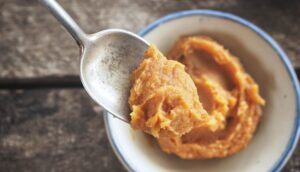
Miso is a traditional Japanese savoury paste made by fermenting soybeans with a type of fungus known as Aspergillus oryzae, or koji.
Rich with umami flavour, it can be used to make soups, salad dressings, glazes and marinades, and will enhance the flavour of your cooking, whether you’re making classic Japanese fare or cuisine from around the world – even including the occasional innovative dessert!
Naturally vegan friendly and delicious, this is a fermented food to keep on hand at all times. For maximum live probiotic content, look for traditionally made, unpasteurised miso and, when cooking with it, allow it to get hot but not boiling. Like kimchi, it is high in salt, so is best used in moderation.
5. Sauerkraut
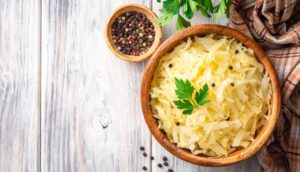
Originating from Germany, sauerkraut is a traditional fermented cabbage condiment that has gained widespread popularity as a healthfood thanks to its of gut-healthy probiotic content.
Unlike its Korean cousin, kimchi, it’s not spicy, so it is suitable for a wider range of palates and can be used in everything from sandwiches and wraps to salads, Buddha bowls, and as a side or topping for all kinds of savoury dishes.
It’s also easy to make at home but, if buying pre-prepared, just look out for unpasteurised options and live probiotic claims to ensure you’re getting the benefit of live cultures.
6. Probiotic herbal tea
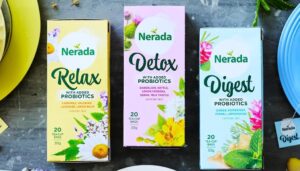
Yes, this is a thing, and yes, we’re talking hot herbal infusions – but with a probiotic boost. This is thanks to a probiotic strain called GanedenBC30 (Bacillus coagulans GBI-30, 6086), a neutral-tasting vegan ingredient used in fortified foods and beverages – or ‘functional foods’. Highly resilient and stable, GanedenBC30 survives even high temperatures, making it perfect for use in hot tea.
Enter: Nerada’s Probiotic Infusion range. Each combines carefully chosen herbs and flowers to produce a delicious, feel-good infusion, boosted by GanedenBC30, which has been proven to support digestive health. With a choice of three comforting varieties, this offers another great way to nourish our gut garden on a daily basis:
- Detox: A delicious invigorating brew made with Dandelion, Nettle, Lemon Verbena, Senna and Milk Thistle
- Relax: A soothing blend of Camomile, Valerian, Lavender and Lemon Balm
- Digest: A refreshing and naturally caffeine-free blend of Ginger, Peppermint, Fennel and Lemongrass
Nerada’s Probiotic Infusions are available to buy at independent retailers or online at neradatea.com.au.




